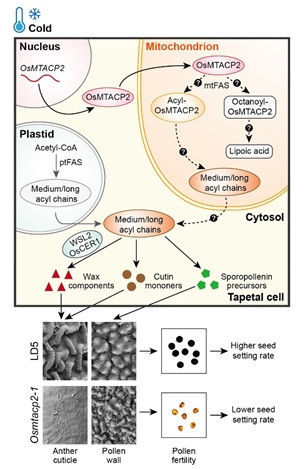Rice, originating from tropical and subtropical regions, is highly sensitive to low temperatures. Cold stress occurring at the booting stage severely impacts rice production. Understanding the molecular mechanisms underlying cold tolerance and utilizing molecular design methods to expedite the development of new cold-tolerant varieties is an effective strategy for preventing cold injury at the booting stage. However, the known molecular mechanism of rice responding to cold is very limited, severely hindering the breeding of cold-tolerant varieties.
The latest discovery comes from a research team led by Prof. CAO Xiaofeng at the Institute of Genetics and Developmental Biology (IGDB), Chinese Academy of Sciences (CAS). Their study sheds light on the crucial role of the acyl carrier protein OsMTACP2 in promoting anther and pollen grain development under low temperatures, thereby positively regulating cold tolerance at the booting stage.
In this study, OsMTACP2, which encodes a highly conserved acyl carrier protein, was identified as an essential gene for cold tolerance through genetic screening of an EMS-mutagenized M2 population in the background of the cold-tolerant japonica cultivar Longdao 5 (LD5). Loss of OsMTACP2 function compromised cold tolerance, hindering anther cuticle and pollen wall development, resulting in abnormal anther morphology, lower pollen fertility and seed setting.
Comparative transcriptomic analysis revealed differential expression of genes related to lipid metabolism between the wild type and the Osmtacp2-1 mutant upon cold. Further lipidomic analysis pinpointed wax esters, the primary lipid components of the anther cuticle and pollen walls, as cold-responsive lipids.
These findings highlight the essential role of OsMTACP2-mediated wax ester biosynthesis in rice’s cold tolerance during the booting stage.
This study entitled “The acyl carrier protein OsMTACP2 is essential for rice cold tolerance at the booting stage” is published online in
Plant Physiology on 2024 (
https://doi.org/10.1093/plphys/kiae118).
This work was supported by grants from STI 2030 - Major Projects, the Strategic Priority Research Program of the Chinese Academy of Sciences, and the National Natural Science Foundation of China.
A proposed model explaining the function of OsMTACP2 in rice cold tolerance at the booting stage (Image by IGDB)
Contact:
Prof. CAO Xiaofeng
Institute of Genetics and Developmental Biology, Chinese Academy of Sciences
 A proposed model explaining the function of OsMTACP2 in rice cold tolerance at the booting stage (Image by IGDB)Contact:Prof. CAO XiaofengInstitute of Genetics and Developmental Biology, Chinese Academy of SciencesEmail: xfcao@genetics.ac.cn
A proposed model explaining the function of OsMTACP2 in rice cold tolerance at the booting stage (Image by IGDB)Contact:Prof. CAO XiaofengInstitute of Genetics and Developmental Biology, Chinese Academy of SciencesEmail: xfcao@genetics.ac.cn CAS
CAS
 中文
中文




.png)
